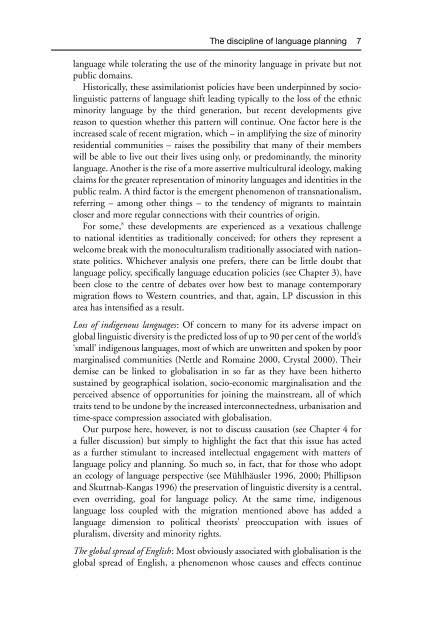Gibson Ferguson Language Planning and Education Edinburgh ...
Gibson Ferguson Language Planning and Education Edinburgh ...
Gibson Ferguson Language Planning and Education Edinburgh ...
Create successful ePaper yourself
Turn your PDF publications into a flip-book with our unique Google optimized e-Paper software.
The discipline of language planning 7<br />
language while tolerating the use of the minority language in private but not<br />
public domains.<br />
Historically, these assimilationist policies have been underpinned by sociolinguistic<br />
patterns of language shift leading typically to the loss of the ethnic<br />
minority language by the third generation, but recent developments give<br />
reason to question whether this pattern will continue. One factor here is the<br />
increased scale of recent migration, which – in amplifying the size of minority<br />
residential communities – raises the possibility that many of their members<br />
will be able to live out their lives using only, or predominantly, the minority<br />
language. Another is the rise of a more assertive multicultural ideology, making<br />
claims for the greater representation of minority languages <strong>and</strong> identities in the<br />
public realm. A third factor is the emergent phenomenon of transnationalism,<br />
referring – among other things – to the tendency of migrants to maintain<br />
closer <strong>and</strong> more regular connections with their countries of origin.<br />
For some, 8 these developments are experienced as a vexatious challenge<br />
to national identities as traditionally conceived; for others they represent a<br />
welcome break with the monoculturalism traditionally associated with nationstate<br />
politics. Whichever analysis one prefers, there can be little doubt that<br />
language policy, specifically language education policies (see Chapter 3), have<br />
been close to the centre of debates over how best to manage contemporary<br />
migration flows to Western countries, <strong>and</strong> that, again, LP discussion in this<br />
area has intensified as a result.<br />
Loss of indigenous languages: Of concern to many for its adverse impact on<br />
global linguistic diversity is the predicted loss of up to 90 per cent of the world’s<br />
‘small’ indigenous languages, most of which are unwritten <strong>and</strong> spoken by poor<br />
marginalised communities (Nettle <strong>and</strong> Romaine 2000, Crystal 2000). Their<br />
demise can be linked to globalisation in so far as they have been hitherto<br />
sustained by geographical isolation, socio-economic marginalisation <strong>and</strong> the<br />
perceived absence of opportunities for joining the mainstream, all of which<br />
traits tend to be undone by the increased interconnectedness, urbanisation <strong>and</strong><br />
time-space compression associated with globalisation.<br />
Our purpose here, however, is not to discuss causation (see Chapter 4 for<br />
a fuller discussion) but simply to highlight the fact that this issue has acted<br />
as a further stimulant to increased intellectual engagement with matters of<br />
language policy <strong>and</strong> planning. So much so, in fact, that for those who adopt<br />
an ecology of language perspective (see Mühlhäusler 1996, 2000; Phillipson<br />
<strong>and</strong> Skuttnab-Kangas 1996) the preservation of linguistic diversity is a central,<br />
even overriding, goal for language policy. At the same time, indigenous<br />
language loss coupled with the migration mentioned above has added a<br />
language dimension to political theorists’ preoccupation with issues of<br />
pluralism, diversity <strong>and</strong> minority rights.<br />
The global spread of English: Most obviously associated with globalisation is the<br />
global spread of English, a phenomenon whose causes <strong>and</strong> effects continue






